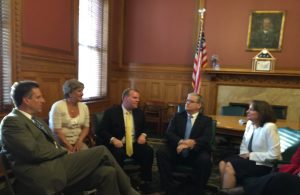Encouraging Economic Development
To keep our state moving in the right direction, we need to foster economic growth and remain focused on promoting our innovation economy, strengthening the manufacturing sector, supporting housing and infrastructure upgrades, and supplying the training and equipment needed for workforce development throughout the state.
As a member of the Joint Committee on Ways and Means, House Post Audit and Oversight Committee and Municipalities Committee, Rep. Stanley is focused on creating a stronger economy though smart investments. As an experienced leader, Rep. Stanley knows that strong local economies allow municipal governments to provide the best services and opportunities to all our residents. High quality police, fire, schools, libraries, and other public services all cost money, and a thriving business community creates jobs for our neighbors and shifts more of the tax burden away from home owners. As state representative, Rep. Stanley has supported smart economic development and job creation initiatives.
In 2016, Rep. Stanley supported an economic development bill aimed to enhance the state’s position as a global economic competitor and support residents through education programs.
For the first time, the legislation creates an education tax incentive program (529 plan) which will allow single filers to take a $1,000 tax deduction on contributions to college savings accounts.
Recognizing the unique role that early-growth companies and emerging sectors have in revitalizing the economy, the bill includes numerous provisions to support the innovation ecosystem including:
• Creates the Angel Investor Tax Credit to incentivize investment and foster growth in newly formed start-ups in Massachusetts. Investors are eligible for a 20 percent credit of the qualifying angel investment and 30 percent if the recipient business is located in a Gateway City.
• Allows for $500 Million in bonding authorization for the MassWorks Infrastructure program.
• Establishes the Digital eHealth Institute, which will be run by the Massachusetts Technology Collaborative in coordination with the Secretary of the Executive Office of Housing and Economic Development, to enhance the state’s rapidly emerging e-health cluster.
• Authorizes $4.5 Million to launch the Cybersecurity and Data Analytics Technology Department & Training Center. This organization will bring together universities, government and private industry participants to bolster the Commonwealth’s data analytics and cybersecurity sectors.
The legislation takes multiple steps to further develop talent, support students and keep graduates in Massachusetts. It authorizes:
• $45 million for Workforce Skills Capital Grants;
• $71 million the National Network for Manufacturing Innovation Funding;
• $30 million for the Advanced Manufacturing, Technology and Hospitality Training Trust Fund;
• $2.4 million for the Early College High School Initiative, a program that encourages partnerships between regional school districts and institutions of public higher education.
This bill also authorizes:
• $15 million for the Innovation Infrastructure Fund, a new grant and loan program aimed at spurring entrepreneurship across the state, particularly through the use of co-working spaces and innovation centers;
• $45 million for the Brownsfields Redevelopment Fund;
• $45 million for the Transformative Development Fund, a program that makes equity investments in major development programs in Gateway Cities.
Lastly, the bill also authorizes $15 million for the Smart Growth Housing Trust Fund, creates a new local option so a community can develop “starter home zoning districts” and reforms the Housing Development Incentive Program.

